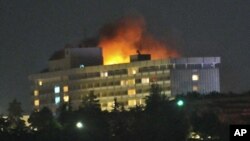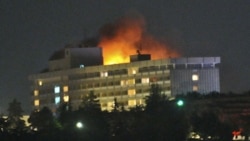The United States has designated Qari Zakir, also known as Abdul Rauf, as a Specially Designated Global Terrorist. Mr. Zakir is the chief of suicide operations for the Haqqani network. The network itself, which has links to the Taliban and al-Qaida, was designated a Foreign Terrorist Organization by the U.S. in September.
State Department spokesperson Victoria Nuland described Qari Zakir’s terrorist activities and the consequences of the designation by the U.S.:
“He is the chief of suicide operations for the network. He is also the operational commander in Kabul, In Takhar, in Kunduz, in Baghlan provinces of Afghanistan. He’s also responsible for the training program. So it just makes absolutely clear to American entities that they shouldn’t deal with him in any way, shape or form.”
Ms. Nuland also noted that a United Nations Security Council committee has designated the Haqqani network and Qari Zakir as well, which, she said, “greatly broadens the pressure that they are under from the international community.”
The sanctions imposed by the UN Security Council’s Afghanistan/Taliban Sanctions Committee on November 5th require all UN member states to implement an asset freeze, travel ban, and arms embargo against Qari Zakir and the Haqqani network.
Susan Rice, the U.S. Permanent Representative to the United Nations welcomed the decision by the UN. In a statement, she called Zakir “an operational commander who has been involved in many of the Haqqani Network’s highest-profile suicide attacks,” including attacks on “coalition force bases Salerno and Chapman in 2010, the Intercontinental Hotel in Kabul in June 2011, which killed 11 civilians and two Afghan policemen, and the U.S. Embassy in Kabul in September 2011, which killed 16 Afghans, including at least six children.”
Ambassador Rice said the UN action “confirms the international community’s resolve to end the Haqqani Network’s ability to execute violent attacks in Afghanistan. It also reflects the Security Council’s commitment to use and enforce sanctions against those who threaten peace in Afghanistan, in conjunction with a strong commitment to support Afghan-led peace and reconciliation.”
State Department spokesperson Victoria Nuland described Qari Zakir’s terrorist activities and the consequences of the designation by the U.S.:
“He is the chief of suicide operations for the network. He is also the operational commander in Kabul, In Takhar, in Kunduz, in Baghlan provinces of Afghanistan. He’s also responsible for the training program. So it just makes absolutely clear to American entities that they shouldn’t deal with him in any way, shape or form.”
Ms. Nuland also noted that a United Nations Security Council committee has designated the Haqqani network and Qari Zakir as well, which, she said, “greatly broadens the pressure that they are under from the international community.”
The sanctions imposed by the UN Security Council’s Afghanistan/Taliban Sanctions Committee on November 5th require all UN member states to implement an asset freeze, travel ban, and arms embargo against Qari Zakir and the Haqqani network.
Susan Rice, the U.S. Permanent Representative to the United Nations welcomed the decision by the UN. In a statement, she called Zakir “an operational commander who has been involved in many of the Haqqani Network’s highest-profile suicide attacks,” including attacks on “coalition force bases Salerno and Chapman in 2010, the Intercontinental Hotel in Kabul in June 2011, which killed 11 civilians and two Afghan policemen, and the U.S. Embassy in Kabul in September 2011, which killed 16 Afghans, including at least six children.”
Ambassador Rice said the UN action “confirms the international community’s resolve to end the Haqqani Network’s ability to execute violent attacks in Afghanistan. It also reflects the Security Council’s commitment to use and enforce sanctions against those who threaten peace in Afghanistan, in conjunction with a strong commitment to support Afghan-led peace and reconciliation.”






